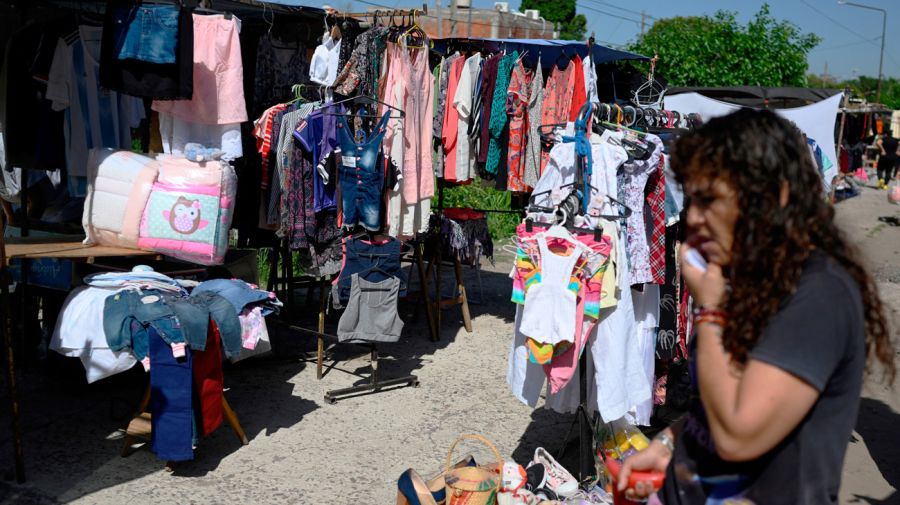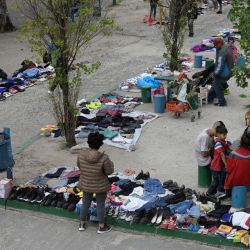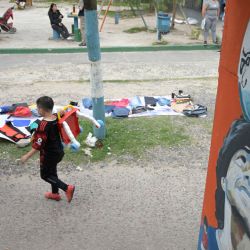An old T-shirt for a handful of rice or some eggs: ever more Argentines are relying on barter to survive in a fast-worsening economy dominating the debate ahead of Sunday’s presidential election run-off.
On the side of a dusty road in the impoverished Villa Fiorito neighbourhood in Buenos Aires province, locals display old clothes, shoes or used household items on blankets spread out on the ground.
Articles of clothing are exchanged for a bag of pasta, some sugar, a few biscuits. Some items sell for a few hundred pesos.
"Food is very expensive," says 25-year-old Luz López from behind her makeshift stall on the edge of a small square of Villa Fiorito – celebrated for giving the world Diego Maradona, whose image oversees the bustling trade from numerous large murals in his honour.
In and around the teeming capital of Buenos Aires, it is an increasingly common sight for people to knock on doors asking for second-hand clothes to wear, barter or sell.
"Sometimes you're out walking, you find things, you wash them and bring them here" to trade, López, a mother of two small children, said about her frustratingly limited options for making ends meet.
Elsewhere on the square, 28-year-old María Fernanda Diaz said she sleeps under a pedestrian bridge and lives mainly on alms.
"Let the politicians come here to see how we live!" she exclaimed.
Four in every ten Argentines today live below the poverty line, according to official figures, with year-on-year inflation at 143 percent.
"Every day there are new prices," said Emilce Elisabeth Bravo, a 35-year-old mother of two who also tries to get by selling odds and ends she collects where she can.
"Diapers are very expensive – previously a pack cost 2,600 pesos, today it is 4,500 pesos [almost US$13]," she said, in a country where the monthly minimum wage was equal to about US$420 in November.

(AFP/LUIS ROBAYO).
'Great precarity'
Bravo administers one of numerous Facebook groups with thousands of members on the lookout for barter deals in the vast capital and its many suburbs. She also works at a soup kitchen.
"We wanted to preserve the idea of bartering, we don't want to lose that camaraderie," she explained. "In the worst moments for the Argentine economy, it has helped us a lot."
Notebooks for cookies. Tea cups for eggs. Every day hundreds of negotiations take place on social media groups. Once a deal is concluded, the exchange is made on a street corner or at small neighbourhood fairs.
"Poverty in Argentina is really dramatic but a very large part of what stops this situation becoming really unbearable is the vast network of support groups that exists," said sociologist Mariana Luzzi of the CONICENT scientific research institute.
She said bartering became common in the difficult years of the 1990s, then exploded with the economic crisis of 2001 when Argentina was responsible for the biggest debt default in history – around US$100 billion – followed by a banking collapse and deadly social unrest.
Now, in 2023, "in a context of great precarity, the barter is back," said Luzzi.
As economy minister, ruling coalition presidential candidate Sergio Massa has overseen Argentina's slide into triple-digit inflation.
He unexpectedly scored the most votes in a first voting round last month, with many seemingly scared off by Massa's rival Javier Milei, a self-described "anarcho-capitalist" who has vowed to "dynamite" the Central Bank, dollarise the economy and slash public spending.
"Argentines have a strong capacity for resilience," said Elisabet Bacigalupo, an economist at the Abeceb consultancy firm which forecasts inflation will reach 190 percent by year-end.
But whoever the next president is, she said, the country will likely go through more "months of recession and rising poverty."
related news

What’s in Milei's bill to lower the age of criminal responsibility?

Argentina’s global debt hopes get boost from Ecuador’s bond success

On lowering the age of criminal responsibility – is Argentina legislating in a mood of violent emotion?

Catholic Church rejects Milei bill to lower age of criminal responsibility
by Sandra Ferrer, AFP






















Comments